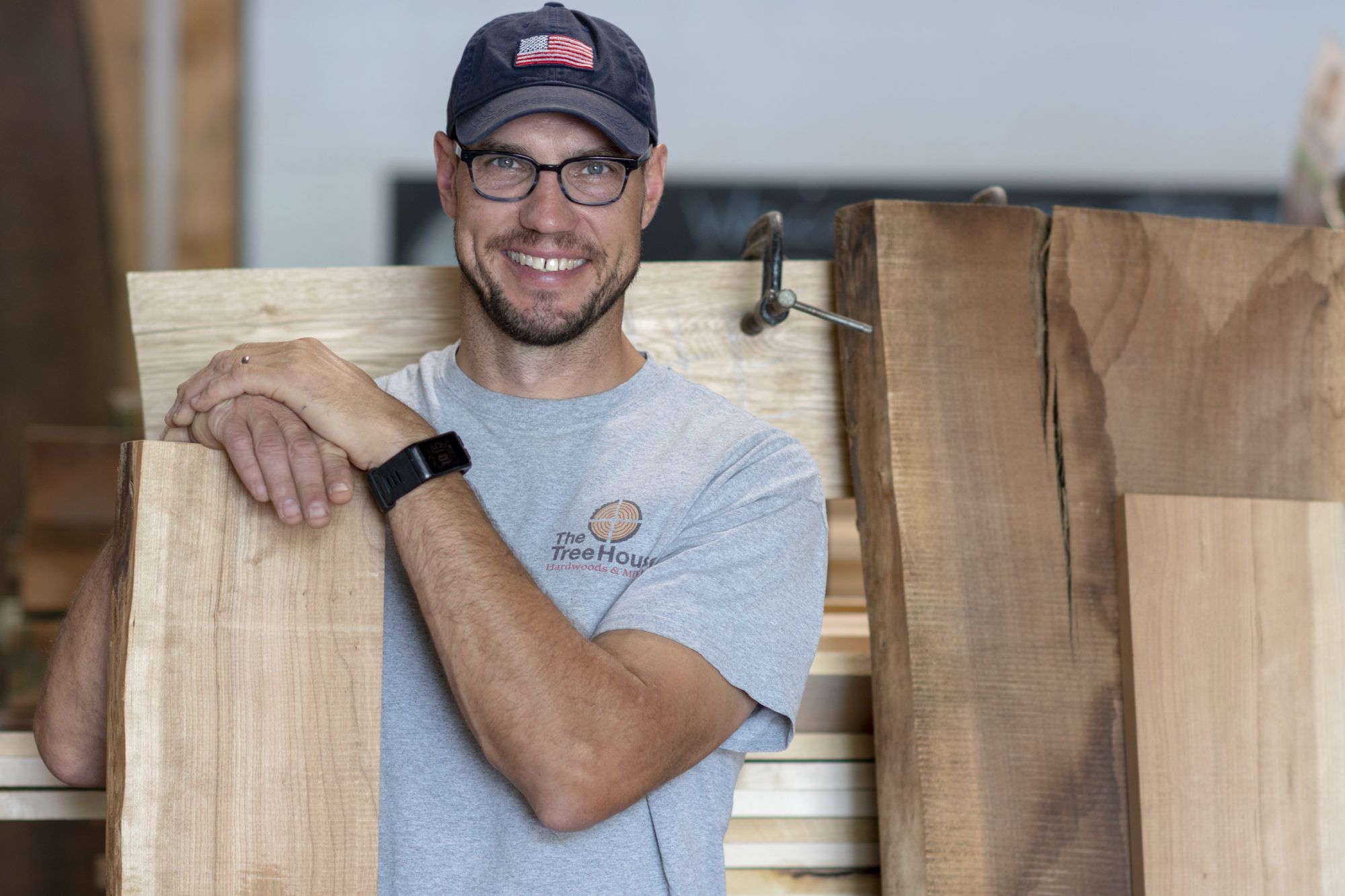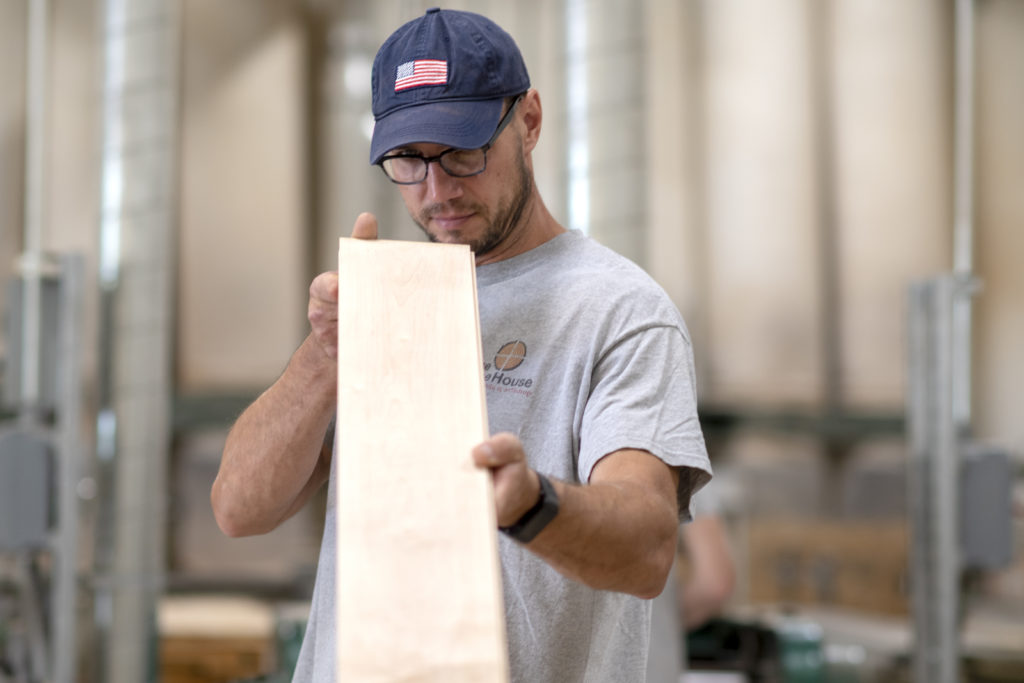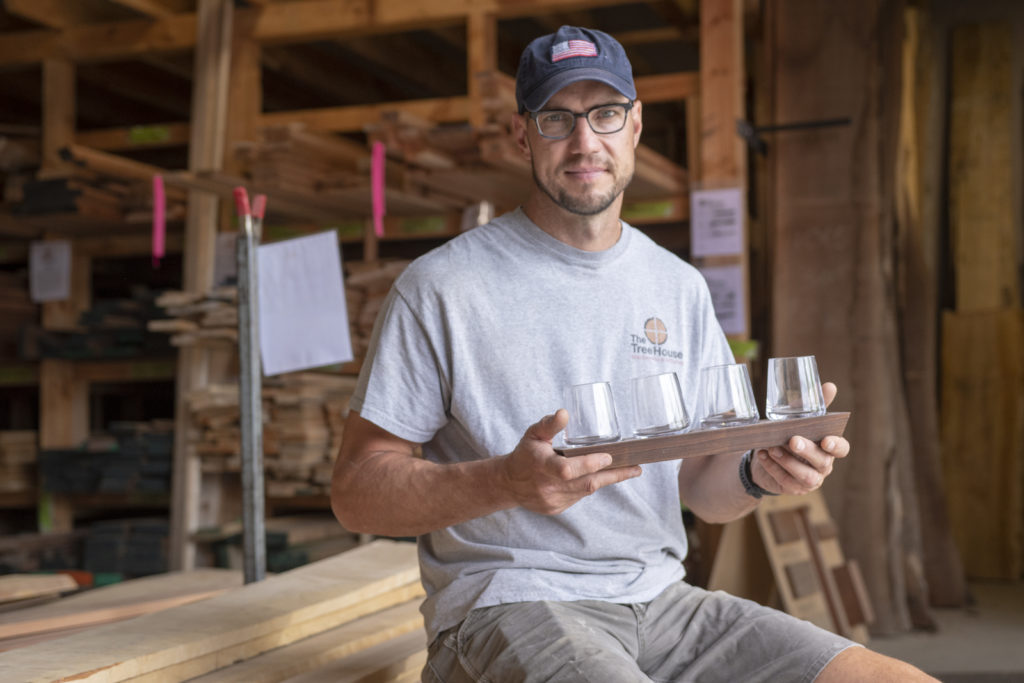Lucas Jenson Makes the Case for Local Wood
August 01, 2018

By Christine McGowan, Forest Program Director, Vermont Sustainable Jobs Fund
People in the forest products industry find their way to wood in different ways. For some, it’s a part of their family DNA. For others, it’s a passion. For Lucas Jenson, owner of The Tree House Hardwoods & Millshop, it’s a vocation that aligns with his belief in supporting the local Vermont economy.
As a former marketing manager at Ben & Jerry’s, Jenson developed a strong appreciation for the social and economic impact business can have in a community. He also developed a deep understanding of the Vermont brand, and how food and agriculture both supported and benefited from the strength of that brand. “I saw an opportunity for wood products from Vermont to align with the localvore movement,” he said. “And the idea of making something real and tangible was appealing.”
Jenson founded The Tree House Hardwoods & Millshop in 2014. As the name suggests, The Tree House is a retailer of hardwood lumber and related products, as well as a custom millshop. Working with contractors and hobbyists alike, The Tree House specializes in domestic and exotic hardwoods, specialty plywoods, butcher blocks, and live edge slabs. They also offer custom milling for contractors, woodworkers and homeowners who may not have the equipment, time or expertise to mill the moldings or other wood parts they need for a project.
Building Relationships, Building a Business
New to an industry that runs back through generations in Vermont, Jenson took advantage of every opportunity to learn and network through events sponsored by the Working Lands Enterprise Board and the Vermont Wood Works Council. It was through industry events that he met three individuals who would become integral to his success– Marshall Webb of Shelburne Farms, Ken Gagnon of Gagnon Lumber, and Andrew Pearce, son of Simon Pearce and owner of Andrew Pearce Bowls.
When Jenson met Marshall Webb in 2014 and realized that a huge amount of the timber harvested from Shelburne Farm’s 1,400 acres was sitting idle in the Old Dairy Barn, he conceived of an idea. “Marshall was managing the forests at Shelburne Farms, but was not set up to sell timber from the harvests. I had recently established my retail shop and it seemed we could benefit each other.” Webb agreed and Jenson began working his way through the 30,000 board feet of lumber and more than 20 different species of wood in the barn and kiln drying it for sale. “There was beautiful wood in there, and we were really just getting started when they had the fire,” said Jenson. The 2016 blaze destroyed the historic Old Dairy Barn along with all of the lumber stored inside.
But the idea of collaboration survived, and Jenson began working with Webb and Dana Bishop, Shelburne Farms Woodlands Manager, to develop timber harvest plans. When Shelburne Farms is ready to do a new timber cutting, they work together to determine the highest and best value for the wood, whether sold as veneer quality logs, milled into live edge or square edge lumber to be kiln dried and offered for sale at The Tree House, or turned into firewood. And Jenson realized something else important to his business. “My customers liked having a connection to the source of their wood. They liked buying not just Maple, but Maple from a sugarbush at Shelburne Farms.” This realization confirmed what Jenson had hoped to be the case — that locally-sourced wood had appeal to his customers.

Lucas Jenson examines maple wood flooring at The Tree House Hardwoods & Millshop in South Burlington. Photo credit: Erica Houskeeper
So, a few months later when Jenson met Ken Gagnon, owner of Gagnon Lumber in Pittsford, Vermont, at another industry event, he proposed a similar arrangement. He promised Gagnon a market for higher grade material that was a match for The Tree House, including Maple, Red Oak, Ash, and Cherry, and suggested that they plan together in advance so that the wood could be milled to meet demand. “My customers appreciate that the wood they are buying was grown in Vermont, cut down by a Vermonter, trucked by a Vermonter, milled by a Vermonter, and is now for sale in a Vermonter-owned retail shop. It’s a value add.”
Growing a Market for Local Wood
Jenson acknowledges that volume is a challenging factor in building markets for locally-sourced wood, noting that large volume furniture makers, for example, need to have a reliable and consistent supply. Spoken like a true marketer, he sees both the “push” and “pull” side of the equation. “On the pull side, we need to talk about increasing consumer awareness so that they are asking for locally-sourced wood, and on the push side, wood product manufacturers need to do a better job sourcing wood from Vermont and using the Vermont brand in their marketing.”
A survey conducted by the Vermont Sustainable Jobs Fund in 2017 confirms that consumers have a strong affinity to Vermont’s forests, and strong associations between Vermont’s quality wood products and the Vermont brand. Perceptions around forests included words like beautiful, peaceful, wildlife, and hiking, while authentic, genuine, local, and unique topped perceptions of wood products made in Vermont. These all tie closely back to key attributes of the Vermont brand and, notes Jenson, “the woodworkers, forest trails, and fine wood products that come out of Vermont are part of why people have such positive perceptions of our state.”

Lucas Jenson is partnering with Simon Pearce to produce handcrafted items such as a wooden base to go with a barware glass set. Photo credit: Erica Houskeeper
Recently, at yet another industry-sponsored event, Jenson met Andrew Pearce, a contemporary in the forest and wood products industry who, as a woodworker, is equally invested in its growth and success. The two began talking about how Jenson might fill a need at Simon Pearce (Andrew’s father) for wooden parts such as the bases for glassware, and Jenson has recently completed his first orders. “This partnership has so much potential for The Tree House,” said Jenson, “and it developed from our shared interest in working with local businesses and supporting the Vermont economy.”
Jenson firmly believes that there is a place for a local wood movement, and he is operating his business as living proof. “Vermont is the greatest state in this country,” he said. “We top the charts on every quality of life list. Supporting a vibrant economy is part of my mission as a business owner, partly because there is value to my business, and partly because it’s the right thing to do.”
Vermont Forest Industry Network
Vermont’s forest products industry generates an annual economic output of $1.5 billion and supports 10,000 jobs in forestry, logging, processing, specialty woodworking, construction and wood heating. The new Vermont Forest Industry Network creates the space for industry professionals from across the entire supply chain and trade association partners throughout the state to build stronger relationships and collaboration throughout the industry, including helping to promote new and existing markets for Vermont wood products, from high quality furniture to construction material to thermal biomass products such as chips and pellets. For more information please visit www.vsjf.org.
Lead Photo: Lucas Jenson founded The Tree House Hardwoods & Millshop in 2014. The Tree House is a retailer of hardwood lumber and related products, as well as a custom Millshop. Photo Credit: Erica Houskeeper




